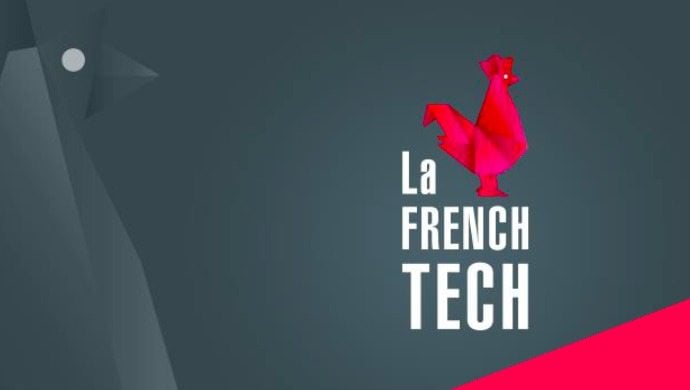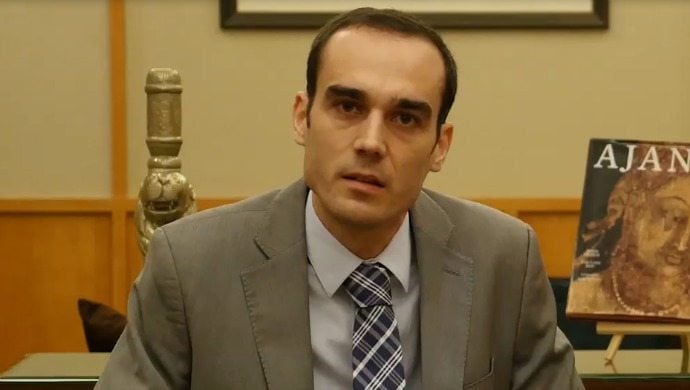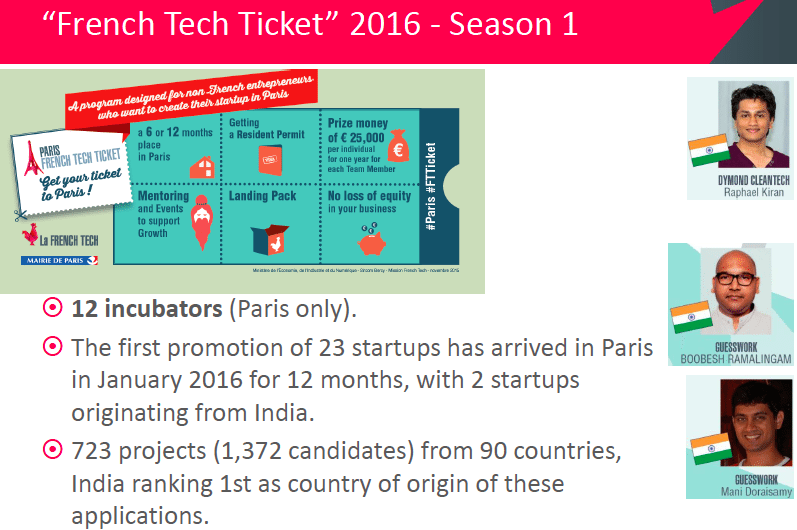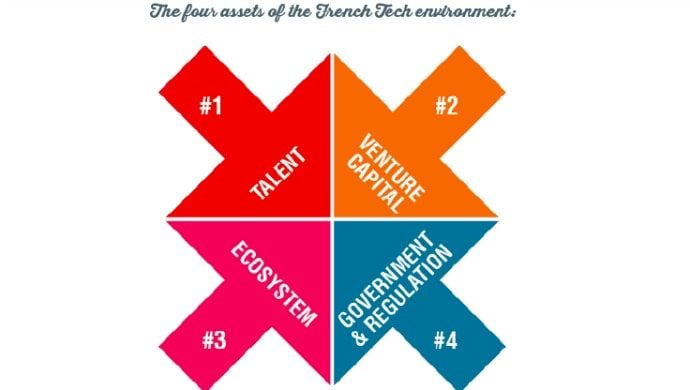Sylvain Biard of French Tech Ticket believes France and India are following the same positive path towards tech entrepreneurship and sees a lot of synergies between the two countries

In 2013, the French government launched a global programme called French Tech Ticket for foreign startups to associate with startups in the country. The programme, now into Season two, has been counting India as a key partner since launch. French Tech Ticket aims to leverage India’s fast-growing entrepreneurial ecosystem by hosting Indian startups in France, thus providing an opportunity for French startups to rub shoulders with their Indian peers and help them scale globally.
Sylvain Biard, who has been posted at the French Trade & Investment Commission for Business France in India since August 2012, is in charge of the programme. He is also in charge of Tech & Services Department of Business France for South Asia. Previously, Biard has fulfilled several assignments within the French Economic Mission in Hanoi and the French Trade Commission UBIFRANCE in Vietnam. These experiences provide him with a deep knowledge in international development, with a key focus on both South Asia and Southeast Asia.
e27 talked to Biard to know more about French Tech Ticket and its partnership with India.
Here are edited excerpts from the interview:
While there have been lots of activities in France, its startup ecosystem has not received much global attention. What could be the reason?
The French tech ecosystem has indeed not yet gained the position it should be aiming in India; the reverse being also true. It even appears that the two countries — while both ranking in the top five tech startup ecosystems in the world — seem to be more systematically focused on other geographies.
In any case, building on the promising level of cooperation shown at the academic and research levels, we are convinced in the capabilities and relevance of the French Tech and India Tech to co-create synergies and economic value, which give us even more eagerness to bridge and synergise further the two ecosystems.

Sylvain Biard
Along with other stakeholders, Business France is thus deeply engaged in this drive aiming at further encouraging Indian tech players to consider France as both a relevant partner and market, and vice versa. The “French Tech Tour to India 2016” to be organised this October shall contribute to this ambition.
French Tech Ticket is aimed at internationalising the French startup ecosystem. How will you achieve this goal just by hosting startups from outside?
Through the French Tech Ticket programme, our objective is to further internationalise the French tech ecosystem, since we believe that such ecosystems should be inter-connected and opened, rather than auto-centric, to stimulate further innovation, value creation and job creation.
While over 40 per cent of the 70,000-plus PhD students in France are foreigners, this ratio is much lower when it comes to tech entrepreneurship.
Also Read: “Latin American startup ecosystem is 10-12 years behind India”
For instance, Paris City tech incubators currently welcome approximately five per cent of foreign tech startups in their portfolio. Hence, it has set itself the objective of reaching 30 per cent of such foreign startups and entrepreneurs by 2020. Our tech incubators are thus looking at tying up with foreign counterparts for developing exchanges of startups.
Apart from a few startups like BlaBlaCar, no startups are popular in India or are not counting India as a key market…
We have in fact crossed over 50 ICTs and digital French tech players directly availing legal set-ups in India, with some big names established there. But it is true that these investments had been until recently mostly made by large companies, mid-caps and some mature SMBs.

However, young French tech startups have for the past two years started to entering India. For instance, BlaBlaCar (ride-sharing services), Criteo (performance digital advertising), Embisphere (RFID solutions), FAMOCO (secure NFC Android readers), Happn (meeting app), News Republic (news aggregator) and Planet Ride (road-trips and adventures marketplace).
In addition, it is noteworthy to mention the fact that an even larger number of these French tech startups have been engaged with Indian stakeholders on an indirect or partnership mode. Hence, the attraction and traction of India towards French tech startups has been accelerating, as also confirmed by the growing interest of French incubators such as NUMA (which opened a co-working space with acceleration and Open Innovation programs in 2015 in Bangalore) and large companies and mid-caps to engage into open innovation and acceleration programmes with India.
(Last October, India’s Meru Cabs formed a global alliance with France-based eCab).
What kind of startups is French Tech Ticket accepting and in which areas?
The programme is a global competition for welcoming talented foreign entrepreneurs to France and scaling innovative early-stage startups. It does not only provide for a unique ‘welcome pack’ —- French resident permit, prize money/funding of EUR 45,000 (over US$50,000) per laureate with no loss of equity, 12-month free office space in one of the 41 partner incubators, dedicated acceleration and mentoring programmes — but also an opportunity to address the French and European markets; the European Union standing as the largest integrated consumption market in the World.
Having said this, the programme is basically covering any tech-intensive vertical, from mobile to e-commerce — encompassing IoT, cleantech & greentech, healthtech, biotech and foodtech.
Also Read: Foxconn and French startup Actility launch company to improve IoT in China
For instance, from India — which is interestingly ranked first as the country of origin of the applications received for the Season one (ahead of the US, Russia and Brazil) — applicants mostly originated from the following domains: e-commerce, mobile, tourism & travel, cleantech & greentech, Big Data & fintech, IT, creative industries. Two Indian startups — out of 23 laureates — are currently scaled up in France under the Season 1 programme. They are Guesswork (product recommendation engine for first time buyers online) and Dymond CleanTech (eco-innovative electrochemical water treatment technique using diamond electrodes).
How is the French startup ecosystem playing up?
With 100,000 engineers trained yearly, 6,000-plus tech startups, 200-plus incubators/accelerators, 100-plus active VC funds and more and more large companies and mid-caps involved into startup initiatives, not to mention our Innovation Clusters, France stands among the leading ecosystems globally when considering tech-related entrepreneurship and innovation. It is ascertained by the fact that France led — for the sixth consecutive year — the race in the ‘Deloitte Fast 500, 2015, EMEA’ ranking with 87 laureates.
In addition to public supportive programmes, private initiatives such as the StationF to open in early 2017 in Paris (consisting the retrofit of the Halle Freyssinet to make it the largest business incubator worldwide with over 1,000 startups spread over 33,000 sqm) or the already disruptive Ecole 42 — both supported by the French entrepreneur Xavier NIEL — shall contribute to this dynamics. Also noteworthy is the fact that many MNCs (Cisco, Facebook, General Electric, Google, Huawei, Intel Corporation, Microsoft, Nokia and Samsung) have implemented R&D and innovation centres in France and are increasing the scale of their operations in this domain.

In which tech verticals is France strong at?
The French tech is benefiting both from software- and hardware-centric technologies and capabilities. Also, while France has been historically known for telecommunications and media technologies, for instance, we have seen a growing number of world market leaders emerging in domains such as Big Data & analytics (with success stories such as Criteo, Scality, Talend or Teads), IoT and connected devices (25 per cent of all startups exhibiting at the CES 2015 were French), e-commerce and sharing/on-demand economy, or medtech and biotech (No. 2 in the World for BioTech and No. 1 for MedTech IPOs over 2011-2015).
How do you compare the French startup ecosystem with that of India?
Both ecosystems are playing in the same category when looking at dynamics and numbers. The main difference — from my point of view — may consist the fact that Indian startups would generally consider scaling up in India given its inherent market size and seek a domestic market leadership, while a French startup would look at growing globally to leverage on early innovation and penetration advantages.
We ourselves were considering that French companies and entrepreneurs were excelling at developing state-of-the-art products and technologies while lacking at efficiently pitching and quickly marketing these innovations globally. I personally believe that our stakeholders have been more stringently tackling this drawback, with more and more of our tech entrepreneurs encapsulating global expansion into their strategy straight from the beginning of their venture.
This has been a major tangible shift in recent years, also clearly explaining the rise in the number of world market leaders France has been nurturing. In any case, a key for a tech startup to be successful — be it in France or anywhere else — remains to build a balanced team of founders and core team members comprising of a right mix of technology, management and business development competencies.
I firmly believe that France and India are following the same positive path towards tech entrepreneurship; over 50 per cent of the 18-24 years’ old age group members in France have been currently willing to create their own enterprise.
In parallel, graduates are more and more inclined at seeking job opportunities within startups to the detriment of more traditional economic players. In other words, both countries share this entrepreneurial ground and mindset within its youngest generations to propel Innovation and disruption.
Hence, for some years now, the French tech scene has seen a rapid growth, driven by this new generation of entrepreneurs, investors, engineers, designers and other talented people, likewise in India.
When it comes to failure, I believe that it has now become much more acceptable. Also, while globally over 85 per cent of new ideas fail due to various factors, the French government has been incentivising risk-taking (incentives for new innovative companies, ambitious R&D Tax Credit mechanisms, etc.).
The post Why is the French government so interested in Indian startups? appeared first on e27.